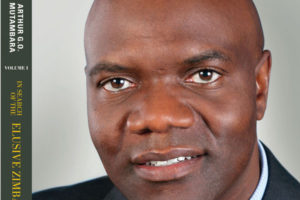 SINCE the dawn of independence on April 18, 1980, Zimbabweans have striven to achieve the Zimbabwean Dream – peace, equality, stability, inclusive democracy and shared economic prosperity.
SINCE the dawn of independence on April 18, 1980, Zimbabweans have striven to achieve the Zimbabwean Dream – peace, equality, stability, inclusive democracy and shared economic prosperity.
This aspirational vision has remained largely elusive, notwithstanding the extensive efforts towards its achievement. These vigorous attempts have been rooted in unflinching determination by an active citizenry.
In Search of the Elusive Zimbabwean Dream is a series comprising three books based on my political interpretations, leadership opinions and philosophical disposition over a period of 35 years, from 1983 to 2017. This is an era in which my generation and the rest of the nation have sought to become the change they wish to occur in Zimbabwe. It is a period whose hallmark is a growing political consciousness and involvement of my generation in an effort towards political and socio-economic transformation and regeneration.
This Autobiography of Thought Leadership is a collection of three volumes of grounded reflections that I expressed over time, as I endeavoured to move, lead and inspire people. These reflections were informed by research, observation and experiences. The trilogy records my initiatives that sought to turn strategic thinking into reality through the speed of execution. The work is ostensibly the documentation of my participation in, and contributions to, thought leadership – intellectual influence through innovative and pioneering thinking.
My ambition has always been to change the world by igniting citizen activism through ideas. The collection is a journey of ideas that created evolutionary, and even revolutionary, advancement of inclusive democratic values, institution building, social justice, empowerment, shared economic prosperity, people-centred governance, ethical leadership and efficacious statecraft. Events and circumstances leading to, and informing, the documented thoughts are presented and discussed. Thus, the three books consist of contextualised anthologies of speeches, statements and publications I have made over 35 years.
Admittedly, over such a long expedition, from 1983 to 2017, there have been mistakes, failures, oversights, but there was intellectual growth and expansion, as my ideas distilled and in some cases changed, crystallised, broadened and deepened. In some instances, there have been radical shifts, as was the case with my position on the one-party state system. It is also of significance that some of the forthright speeches on social, political and economic matters presented in these books have led to my persecution, arrests, torture, detention and trial by the authorities in Zimbabwe.
The speeches in this anthology reveal unrelentingly consistent themes and ideological dispositions from 1983 through to 2017. These enduring themes include a belief in the legacy and values of the liberation struggle, anti-imperialism, servant leadership, egalitarianism, justice and equality. Although the paradigms and prescriptions proffered in these books span a period of more than three decades, their intrinsic value and relevance are both enduring and timeless.
This is particularly so for the postulations on value systems, redefining competitiveness, national vision, regional integration, nation branding, 21st-century Pan-Africanism, China-Africa relationships, unmined resource value, the sovereign wealth fund concept, the ICT revolution, womenomics, green economy leverage, creating shared value, making sustainability profitable, and talentism. In fact, these aspects of thought leadership and empowering statecraft have become even more relevant and applicable in our beloved Zimbabwe today than when they were first proffered.
While the views are primarily in pursuit of the Zimbabwean Dream, there is a strong Pan-Africanist thread pervading all the thoughts, particularly in the later years, which include my invaluable tenure as Deputy Prime Minister of the Republic of Zimbabwe. Hence, the material presented in the three books also lays the foundation for the ambitious vision of the African Dream, characterised by a peaceful, stable, integrated, democratic, technology-driven, industrial, and economically prosperous continent according all the associated social amenities to its citizenry.
Under globalisation, the nation state is no longer a viable unit of analysis, political stability, economic growth or security, neither is it still the best platform for survival or prosperity. Instead, regional and continental initiatives, organisations and frameworks have since become the more efficacious platforms. Successful civilisations flourished, and continue to do so, because they cherish reading and writing their own experiences.
Documentation is divine, sacrosanct, instructive, durable and eternal. The three books constitute a modest and personal effort at addressing this challenge within the Zimbabwean context. My views and thoughts over the past 35 years which are documented in the three books are organised as follows: Volume I: The Formative Years and the Big Wide World (1983–2002); Volume II: The Path to Power (2003–2008); Volume III: The Deputy Prime Minister and Beyond (2009–2017).
This book, Volume I, deals with my formative years and early professional career during my sojourn in the big wide world. The starting point is engaging the thoughts and experiences that shaped my early consciousness and politics. The record of my reflections starts in 1983 as a 16-year-old Form 3 student at Hartzell High School in Manicaland, Zimbabwe. The book is organised into three sections: Section One – A Naive but Vigorous Young Mind (1983–1986); Section Two – No to the One-Party State! Yes to Socialism! (1987–1991); and Section Three – Out into the Big Wide World (1991–2002).
Each of these sections opens with a chapter in which I present the context in terms of the events and circumstances leading to, and informing, the documented thoughts and views. I also review some of the outcomes and analysis thereof. The context, circumstances and issues are discussed in the present tense as the events unfold. In the subsequent chapters, the speeches are also presented in the same tense. This book provides a story of ideas and thoughts as they develop.
Post published in: Entertainment

